A study found that 85% of organisations are concerned about reducing their greenhouse gas emissions, yet only 9% of companies are able to quantify their total emissions comprehensively (BCG).
Accordingly, carbon accounting measures and tracks the amount of CO2e an activity or entity emits. Modern companies use software to make this process easier, automated, more accurate, and more frequent, ensuring reliable data for sustainability reporting.
What is carbon accounting software?
Leading carbon accounting software is decarbonisation-first: Certified calculations power the identification of the reduction actions with the biggest potential.
Explore Plan A’s Carbon Management Platform via the interactive demo below:
The 12 best carbon accounting software
Looking for the best carbon accounting software to meet the specific sustainability needs of your business? We have ranked the 12 best options on the market in 2025:
1. Plan A
Plan A offers a carbon management platform focused on decarbonisation. It helps businesses streamline carbon accounting, reporting, and emissions reduction with TÜV-certified, SOC 2 and GDPR compliant tools. Backed by expert support and subject matter specialists, it ensures efficiency and compliance with regulations.
The platform embeds AI to guide you through data mapping, memorise your conventions and custom systems, and detects anomalies. It also helps you connect the dots from the data to the report, and from the report to the action plan. The tool lets you use decarbonisation scenarios and project return on investment.
What sets Plan A apart is its personalised services and decarbonisation-first approach, making it easier for companies to reduce emissions and achieve sustainability goals. Trusted by brands like BMW, Visa or Alphabet Plan A is a leader in the mid to large company segment.
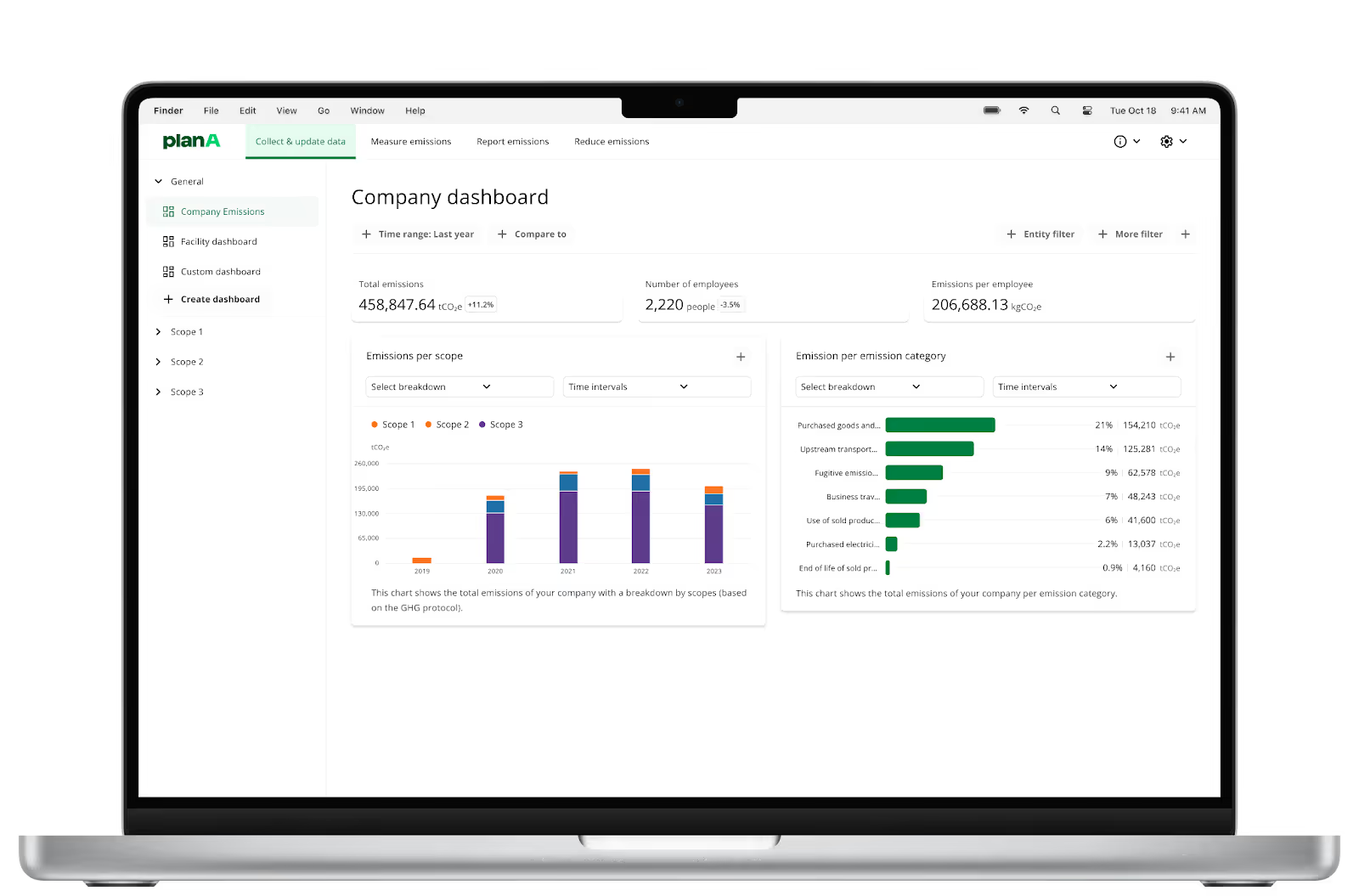
2. IBM's Environmental Intelligence Suite
IBM's Environmental Intelligence Suite is a legacy software for data and emissions management designed to assist organisations with data and emissions management. The suite incorporates basic climate risk analytics powered by artificial intelligence, offering tools for risk assessment and response. It aims to integrate carbon accounting functionalities into broader business operations, providing a platform for companies to monitor and manage their environmental impact.
The suite also includes features for weather forecasting and geospatial analytics, which can be utilised to assess potential climate-related risks to business operations. While the software provides a range of capabilities, it may not offer the level of customisation that some organisations require for their specific needs. The suite's interface and user experience are designed to be accessible, though some users might find it less intuitive compared to more modern, specialised carbon accounting tools
3. Salesforce's Net Zero Cloud
Salesforce's Net Zero Cloud is a carbon accounting and sustainability management platform designed to help enterprises track and reduce their carbon emissions. The solution leverages Salesforce's cloud-based infrastructure to provide data analytics and reporting capabilities. Net Zero Cloud allows companies to measure their carbon footprint across Scope 1, 2, and 3 emissions, set science-based targets, and monitor progress towards sustainability goals.
The platform offers features such as simplified data collection, dashboards, and integration with other Salesforce products. Net Zero Cloud also includes tools for scenario planning and forecasting, enabling organisations to work on different approaches to emissions reduction. Additionally, the software provides carbon offset management capabilities and supports working on various sustainability reporting frameworks.
4. Microsoft Sustainability Cloud
Microsoft Sustainability Cloud offers a suite of tools designed to help organisations document and report their environmental impact. At the core of this solution is the Sustainability Manager, which enables businesses to collect, analyse, and visualise sustainability data. The platform integrates with existing Microsoft systems, potentially streamlining the data collection process for companies already using Microsoft products.
While Microsoft positions the Sustainability Cloud for mid-market and SMB clients, its scalability for larger enterprises or more complex sustainability reporting needs is less clear. The solution provides features for carbon accounting, water consumption tracking, and waste management reporting. However, as with many emerging sustainability software solutions, its effectiveness may vary depending on the specific requirements and data sources of individual organisations
5. Sphera
Sphera, a company owned by The Blackstone Group, offers an ESG (Environmental, Social, and Governance) and risk management platform. The software aims to centralise emissions reporting and data management, aiming to integrate safety and sustainability management across organisations. Sphera's solution is being developed to help businesses track and report their carbon emissions, as well as manage other environmental and safety-related data.
The platform provides tools for collecting and analysing data from various sources within a company's operations. It offers features such as carbon accounting, life cycle assessment, and regulatory compliance tracking. Sphera's software is utilised by companies across multiple industries, including manufacturing, energy, and chemicals, to support their sustainability initiatives and meet reporting requirements.
6. IBM Envizi
Envizi, recently acquired by IBM, is a sustainability and emissions management platform. It aims to enable organisations to capture, track, and manage emissions data across their operations. The software provides tools for collecting and consolidating environmental data from various sources, including energy consumption, waste generation, and transportation emissions. Envizi's analytics and reporting capabilities can assist companies in meeting their compliance obligations and driving sustainable practices.
The platform offers some features to support carbon accounting and broader environmental management. These include simplified data collection, dashboards, and the ability to generate reports for various sustainability frameworks and standards. Envizi can also communicate with other enterprise systems, allowing for a more integrated approach to sustainability management within an organisation's existing infrastructure. The software caters to a diverse range of industries, from manufacturing and retail to healthcare and financial services.
7. Cority
Cority's Environmental Cloud platform is a comprehensive solution designed to assist organisations in managing their environmental compliance and data across various domains, including air, water, waste, and chemical management. The platform centralises environmental data from multiple sources, providing a unified view of an organisation's environmental performance. It offers tools for data collection, analysis, and reporting, which can be utilised to track and manage carbon emissions as part of broader sustainability initiatives.
In addition to its core environmental management capabilities, Cority's platform includes features for sustainability reporting and greenhouse gas (GHG) emissions tracking. The software allows users to calculate their carbon footprint based on collected data and generate reports that align with various international standards and frameworks. While the platform's primary focus is on environmental compliance, its data management and analytical tools can support organisations in their efforts to monitor and reduce their carbon emissions over time.
8. Workiva
Workiva, a company primarily recognised for its ESG reporting software, has expanded its offerings to include some carbon tracking capabilities. The Workiva Carbon solution enables businesses to collect, manage, and report greenhouse gas emissions data across various use cases. This platform can communicate with financial and operational systems, aiming to facilitate data collection and analysis.
The solution provides features for data validation, audit trails, and simplified calculations to help ensure accuracy in carbon accounting. Workiva Carbon also offers dashboards and reporting tools, which can be used to generate reports related to various regulatory frameworks and voluntary disclosure standards. The platform is designed to support organisations in their efforts to monitor and reduce their carbon footprint, though its effectiveness may vary depending on the specific needs and circumstances of each user
9. Emitwise
Emitwise is a carbon accounting software provider based in London, UK. Founded in 2019, the company develops a platform to help businesses measure, report, and reduce their carbon emissions across their operations and supply chains. Emitwise's solution utilises technologies to help with data collection and analysis, aiming to simplify the process of carbon accounting for organisations.
The software provided by Emitwise enables companies to track their Scope 1, 2, and 3 emissions, aligning with international reporting standards such as the Greenhouse Gas Protocol. It offers features for setting science-based targets, scenario planning, and generating reports for various stakeholders. Emitwise also provides benchmarking capabilities, allowing businesses to compare their performance against industry peers and identify areas for improvement in their sustainability efforts.
10. SINAI Technologies
SINAI Technologies offers a tool designed to assist enterprises in managing their carbon emissions. The software provides interfaces for carbon accounting, target setting, and scenario analysis. It helps with greenhouse gas inventories, works on carbon budgeting, and forecasts low-carbon scenarios. The platform also supports some levels of value chain engagement and offset forecasting, aiming to help organisations develop carbon reduction strategies.
In addition to these features, SINAI's solution includes capabilities for internal carbon pricing and transition risk management. The platform allows users to create dynamic carbon budgets and evaluate various mitigation options. SINAI Technologies, headquartered in San Francisco with an office in São Paulo, serves clients across different industries.
11. Klimahelden
Klimahelden's Digital Climate Manager is a software solution designed to assist companies in managing their carbon footprint. The platform provides tools for tracking, analysing, and reducing CO2 emissions across various business operations. Users can calculate their emissions based on input data and generate reports to gain insights into their environmental impact.
The software also offers features for developing emission reduction strategies and communicating sustainability efforts to stakeholders. Klimahelden's solution includes offsetting options, allowing companies to compensate for their unavoidable emissions through certified projects.
12. Sami
Sami's product provides a suite of tools that aims to assist companies in measuring, reducing, and reporting their carbon emissions. The platform features capabilities for carbon accounting, and data collection from various sources. Additionally, Sami develops tools for reduction planning, allowing businesses to set and track emission reduction targets.
To support its users, Sami's platform includes access to sector-specific consultants who can provide tailored guidance. The company also offers training options to help organisations better understand and utilise the software. Notably, some businesses may be eligible for certain grants when implementing Sami's solution, potentially offsetting some of the costs associated with adopting carbon accounting practices
Essential features to look for in carbon accounting software
Here are 6 critical features businesses should prioritise when searching for a carbon accounting solution:
1. Intuitive and powerful data collection
To ensure accurate and efficient carbon accounting, interfaces for manual input, bulk imports, and API connections help maintain data hygiene and reduce errors. A capable software should also leverage AI
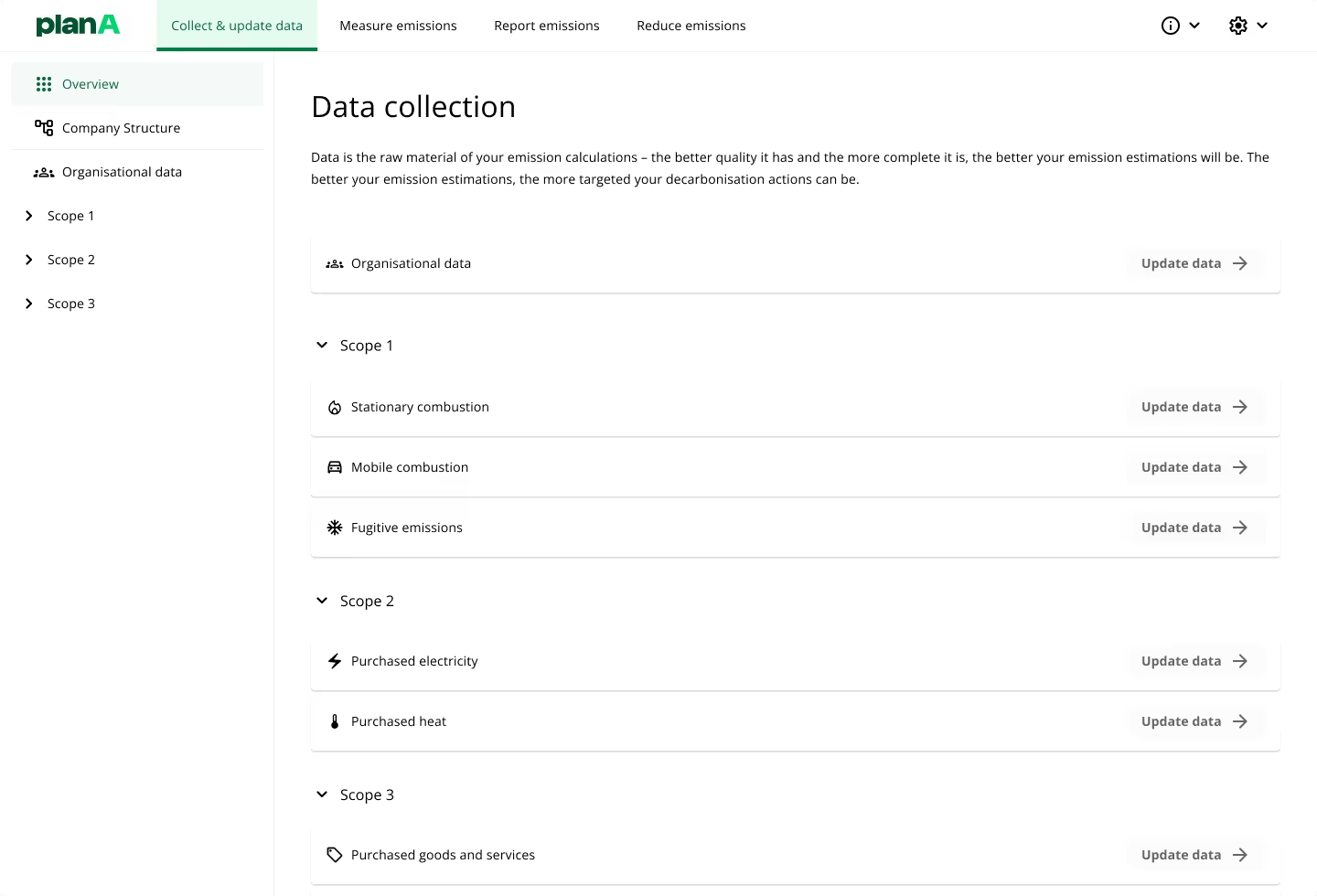
2. Accurate Corporate Carbon Footprint (CCF) calculations
Automates the calculation of a company's carbon footprint, enabling precise measurement of GHG emissions across all scopes. This provides the baseline for reporting and target setting.
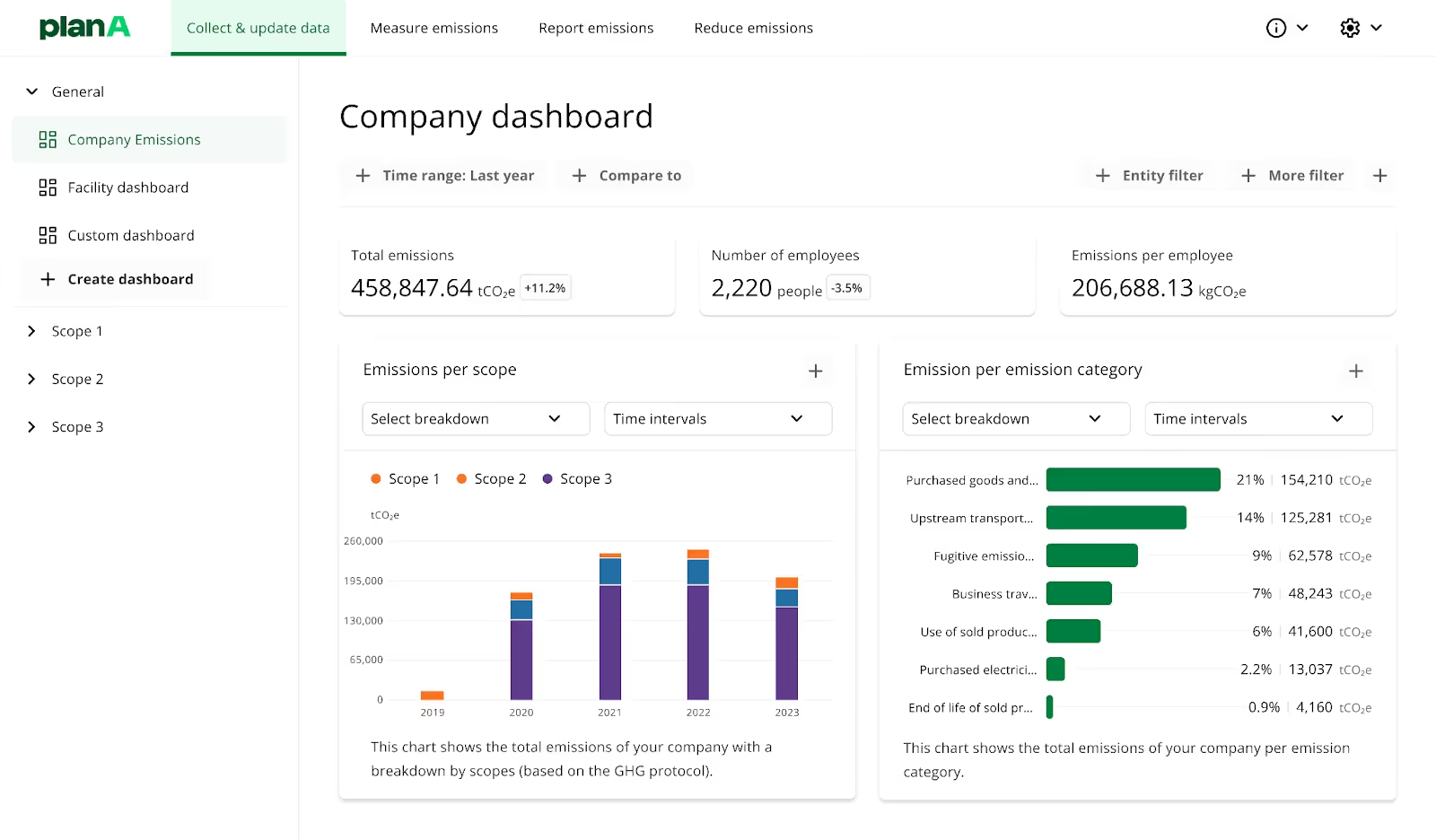
3. Detailed carbon emissions reporting
Facilitates detailed GHG disclosures for regulatory, voluntary, and value chain reporting. Supports the generation of reports in various formats, including ready-to-publish PDFs, raw CSVs and API for larger businesses.

4. Strategic decarbonisation target setting
Assists in setting and visualising emission reduction targets using methodologies like Science-Based Targets (SBTs). Features intuitive charts and graphs for effective progress tracking.
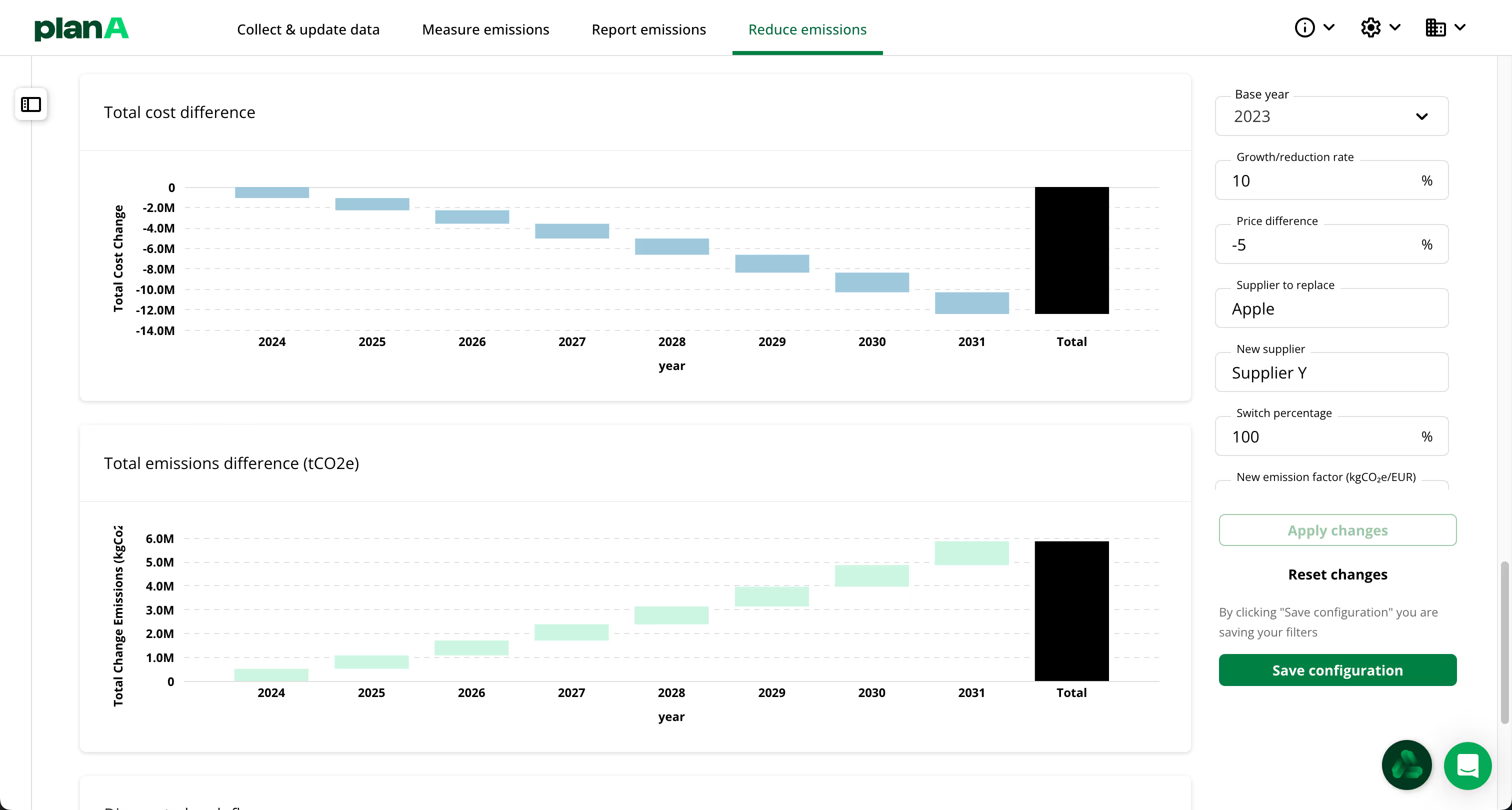
5. Advanced progress tracking and analytics
Provides continuous monitoring of emissions and the net-zero journey with dashboards and visual insights. Advanced analytics empower sustainability teams to make data-driven decisions.
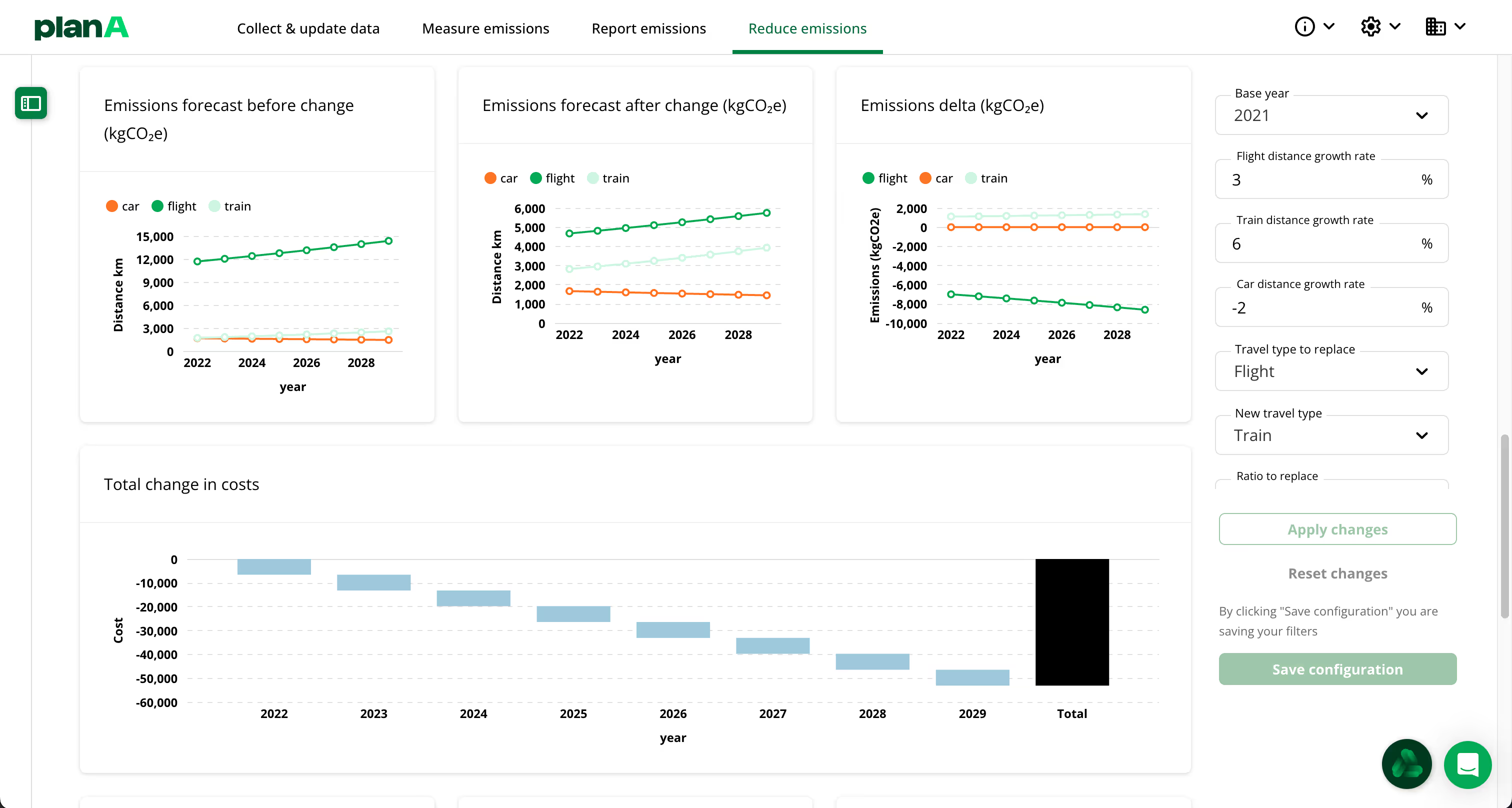
6. Effective decarbonisation action planning
Identifies critical areas for emission reduction and integrates Scope 3 data for comprehensive decarbonisation plans. It recommends and manages projects through an intuitive interface; ensuring efficient, value-chain-wide emissions reduction.

More details about essential features of carbon accounting software can be found in our dedicated article.
Still unsure which software is best to track your business' carbon footprint? Click here to learn more about Plan A’s leading carbon management platform.
Using a dedicated carbon management software versus building internal solutions
Internal solutions, often using multiple spreadsheets and scattered data, lack the expertise and accuracy needed for emissions analysis. A SAP survey found that only a third of mid-market executives are satisfied with their data quality, and 86% still use spreadsheets for emissions tracking.
Switching to carbon accounting software simplifies data collection, automates calculations, and improves accuracy. Read our 11 reasons why you should not use spreadsheets for carbon accounting in our dedicated article.
As a carbon accounting expert, I strongly advocate using sustainability software over internal solutions. Unlike cumbersome internal solutions reliant on spreadsheets, advanced software offers efficient data collection, accurate emissions calculations, streamlined data integration across departments, and enhanced stakeholder transparency. This allows for vast time and cost savings whilst strengthening brand resilience and mitigating risks related to compliance and sustainability commitments.
Johannes Weber, Director of Sustainability Solutions @ Plan A.
How to choose the best carbon accounting software for your company?
To ensure you choose a solution that aligns with your sustainability goals and operational needs, we recommend asking these 12 questions when evaluating carbon footprint software:
Companies looking to make a meaningful impact on the environment must choose a carbon accounting software aligned with GHG Protocol Methodology. GHG Protocol supplies the world's most widely used greenhouse gas accounting and is essential for ensuring accuracy and reliable carbon management. From an operational perspective - prioritising a platform that is easy to use, provides intuitive and data-driven insights, and has a team of real-world climate experts behind it is essential to setting your organisation up for sustainability success.
Nick Dale, Chief Product Officer @ Plan A
Examples of companies using carbon accounting software
Businesses around the globe are using software to overcome carbon accounting challenges and undergo sustainable transformation. Here's a few examples of companies who have seen exceptional results:
AMPECO
AMPECO aimed tpstreamlining data collection and entry, leading to time and resource inefficiencies.Plan A’s Carbon Management Platform enabled AMPECO to efficiently onboard their business activity data; enabling time savings of up to 80%. Petar Georgiev, Head of Sustainability at AMPECO notes that Plan A has allowed for a “significant” amount of time saved on data entry.
Furthermore, AMPECO previously faced difficulty in pinpointing areas for improvement and optimisation across their operations and wider value chain. Plan A’s all-in-one platform with customisable dashboards enabled AMPECO to intuitively analyse their emissions through visual charts to identify areas for improvement and drive decarbonisation progress (e.g. optimising cloud usage and running their platform more efficiently). Ultimately, this has enabled AMPECO to stay on-track toward an ambitious target of 50% Scope 1 & 2 emission reduction by 2025.
Top carbon accounting software providers in 2025
Businesses that do not take the lead on sustainability will ultimately be unable to remain competitive. Accordingly, companies must integrate carbon accounting software into their broader corporate strategy. Companies must look to source a comprehensive and user-friendly platform that is underpinned by data, decarbonisation-oriented, scalable, and able to be tested before purchasing.
What is a good carbon accounting software for EU companies?
Evolving regulations in the EU (see our piece on the Spanish regulations) mean companies are required to adopt robust carbon management systems to ensure compliance and meet growing stakeholder demands. Carbon accounting software enables companies to not only streamline carbon accounting, but also prepare decarbonisation plans in line with frameworks such as the Greenhouse Gas Protocol.
One standout option for EU companies is Plan A. Renowned for its comprehensive features, Plan A offers tailored solutions to navigate the complexities of carbon accounting and regulatory compliance. The software combines data collection, emissions tracking, and actionable insights to help companies reduce their carbon footprint with ease. Moreover, it supports seamless reporting, making it a highly reliable choice for businesses striving to prepare for EU sustainability regulations.
How much does carbon accounting software cost?
The cost of carbon accounting software usually ranges between €3,000 and €80,000+ per year. However, this range can vary significantly based on factors such as company size, industry, the complexity of operations, and the level of customisation required. For instance, a multinational corporation with multiple facilities may incur higher costs due to the need for advanced data integrations and industry-specific analytics.
It’s essential to recognise that the cost of the software is only part of the equation. Choosing a robust platform like Plan A offers added extensive value beyond carbon tracking. Advanced features, such as ROI of decarbonisation tools and cost-saving calculators, help companies identify financially viable emission reduction opportunities. These tools not only enhance sustainability but also improve overall profitability.
For further insights, explore the decarbonisation savings calculator for tailored financial projections or check out the ROI of decarbonisation whitepaper.
What does the future of carbon accounting tools look like?
Carbon accounting tools are evolving rapidly, driven by advancements in technology, stricter regulatory requirements, and a growing emphasis on corporate accountability. Key trends include:
Schedule a call with Plan A experts to equip your company with the leading carbon accounting software.


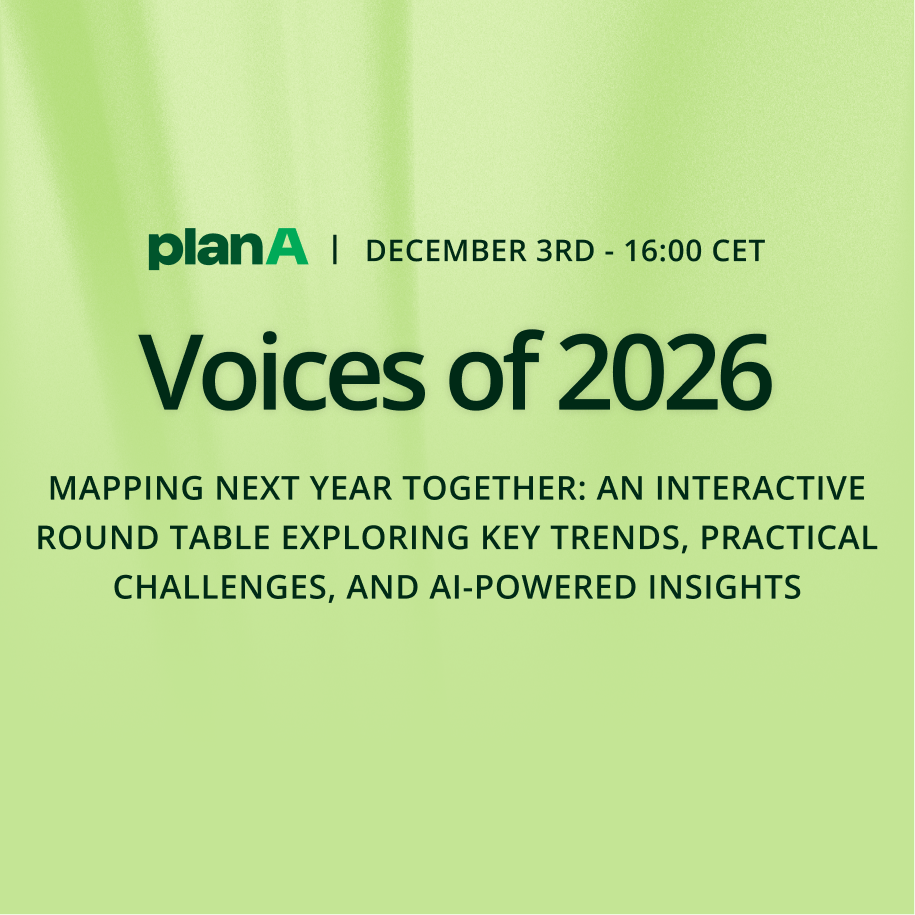
.jpg)




